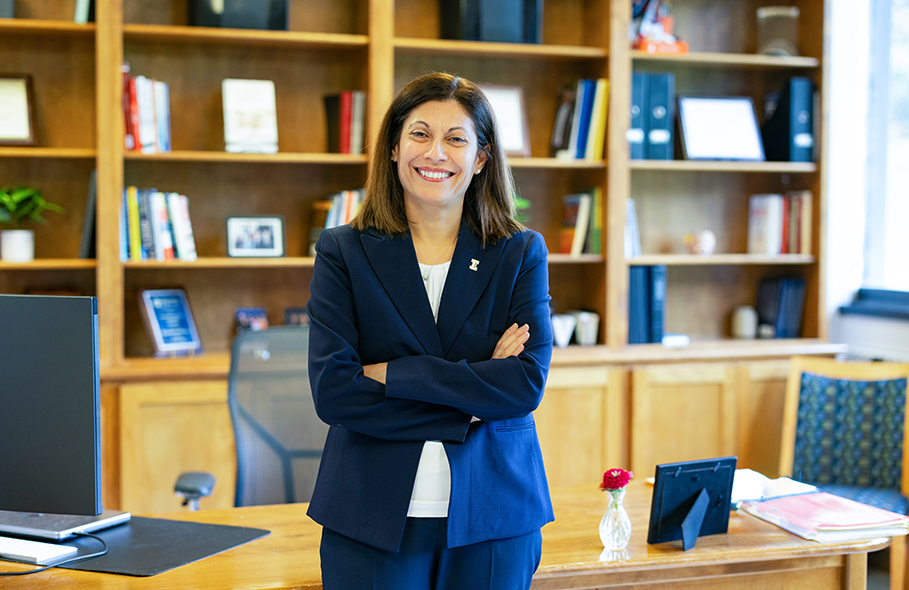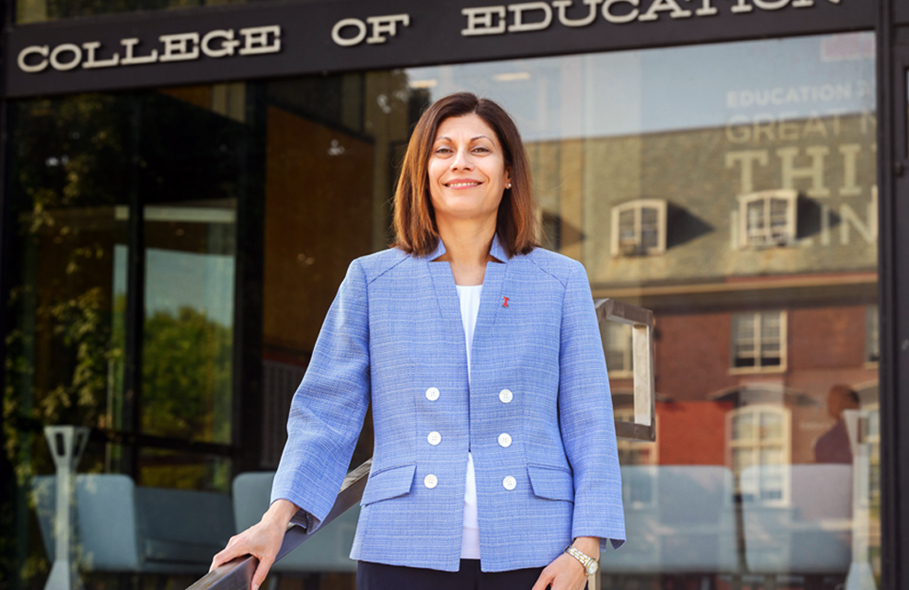Checking in with Dean Mouza: Dynamic Growth, Bright Future
by Communications Office / Dec 4, 2024

Now in your third year as dean, what stands out as you reflect back on your relatively short time at Illinois?
CM: The last two-plus years have been truly remarkable, punctuated by a number of outstanding milestones. I’m so proud of all the work we are doing across all corners of the College. The College of Education continues to lead on critical issues in education by advancing research, teaching, and community engagement.
Over the last two years, we have been tackling the ethical and pedagogical issues around AI through the establishment of INVITE, which stands for the Institute for Inclusive and Intelligent Technologies for Education. INVITE is a $20M NSF-funded AI center that represents the largest external grant in the history of the College. It is only one of many robustly funded research projects our faculty secured in the past two years. In fact, in 2023-24, our external funding marked a college record.
We also continue to advance curricular innovations. In the last two years, we launched a variety of new programs in undergraduate and graduate education. At the undergraduate level, we launched a new CS+Education program as well as a degree completion program in Early Childhood education for nontraditional students. At the graduate level, we created a Master’s program in Instruction Design and Trauma-Informed Teaching, as well as certificates in Cancer in Education in Underrepresented & Diverse Communities, Trauma Informed Education, and Middle Grades Education. We have also expanded our Mental Health Counseling program, which is designed to support increased societal needs in mental health.
What excites you the most as you look to the future for the College?
CM: Several things excite me, but I will highlight two. First, we are embarking on a strategic visioning process within the College to help create a forward-thinking vision aligned with the university’s Boldly Illinois plan. This process will help our College move synergistically in one direction and provide tools to continuously monitor progress toward shared goals.
I am also excited about our efforts to elevate the College’s strengths through the establishment of two pioneering research centers: the Center for Culturally Responsive Evaluation, which was approved as a campus-level Center last year, and the Center for Research and Innovation in Technology-Enhanced Learning, which is currently going through the formal approval process.
CREA is an international community of scholars and practitioners that exists to promote a culturally responsive stance in all forms of systematic inquiry, including evaluation, assessment, policy analysis, applied research, and action research. Education at Illinois is known worldwide for its efforts to support a culturally responsive stance in all forms of systematic inquiry. CREA can be a key resource for evaluation needs across campus.
Similarly, the College is a recognized leader in technology-enhanced learning, and the new center will help consolidate, elevate, and solidify our expertise in this space.
Under your leadership, the College added 16 new faculty members and experienced historic undergraduate enrollment this fall. What is it about the College of Education that propels it to continue to grow despite the challenges in higher ed and the field of education?
CM: Indeed, we are very excited about the trajectory of the College. This year, we welcomed the largest first-year class in the last 50 years, and over the past two years we've hired 25 new faculty members. The College’s continued growth, even amid challenges in higher education and society, is a testament to the dedication, creativity, and innovation of our faculty and staff.
In the undergraduate space, we continue to innovate, developing new programs and curricula that align with current and future societal demands, such as our revised Learning and Education Studies program and the CS+Education program I mentioned earlier.
We also strengthened our collaboration with our talented admissions team and advanced innovative recruitment strategies in collaboration with our Undergraduate Office that help our admitted students witness the excellence and relevance of our programs.
The addition of so many talented faculty speaks to our excellence and reputation as a College. We continue to be at the forefront of transformative and consequential research and teaching and have built a reputation around collaboration and innovation. Our new colleagues bring fresh perspectives and expertise in their respective fields, along with a shared commitment in the mission of the College.
What research strengths of the College are making a difference in the state of Illinois and more broadly?
CM: Our faculty have been conducting pioneering research that makes a difference in the lives of people in the state of Illinois and beyond. The College is a leader in the development and implementation of cutting-edge technologies, including virtual reality, AI, and learning analytics that enhance teaching and learning. Faculty research informs the development of evidence-based practices in teacher preparation, mentoring, and professional development that directly impact learners across the state of Illinois. Our colleagues in special education conduct consequential research that shapes the development of inclusive practices with the potential to support learning for all students.
Finally, faculty research contributes significantly to state policy, including the teaching of social studies, Asian American history, literacy, and computer science, to name a few. These initiatives are not only making a difference in teachers’ and students’ lives, but they also advance important goals in addressing inequities in education and fostering inclusive practices across education systems, which is a long-standing strength of our College.
Can you share about some of the initiatives you've implemented over the last two years to even further strengthen the research enterprise of the College?
CM: We have several initiatives in place to support faculty in building and growing their research portfolios, including personalized coaching, seed grants, scholarship awards, and capacity for grant preparation within our Office of Research. In Summer 2023, we piloted a new seed grant initiative to provide summer support for faculty and graduate students working on joint scholarly initiatives. The interest was immense—we funded 24 faculty/graduate student pairs, and anecdotally they are already sharing the impact of this effort on both faculty and student productivity.
We doubled funding for faculty and student travel awards and provided financial support to Ph.D. admitted students to visit campus during a two-day event to boost recruitment. We also hired a director of school-university research relations to work with our Research Office, and we are piloting training programs to support our increasing number of talented pre-tenure faculty in securing funding for their research.
Finally, we hired an inaugural Associate Dean for Faculty Affairs and elevated the role of the Dean’s Fellow for Faculty Development to provide professional learning opportunities and mentoring to our pre-tenure and mid-career colleagues.
Community engagement is core to the mission of the College of Education. How are the current initiatives making an impact?
CM: Our College has a long-established tradition in building and sustaining community engagement. Our centers and strategic initiatives are making a real impact in the lives of students, teachers, and community members.
Through the Illinois Early Childhood Asset Map (IECAM), state agencies are providing important data regarding the risks the state faces in early childhood well-being and where those risks are not being addressed.
Further, College faculty and staff offer a wide range of online and on-site professional development opportunities for practicing and newly licensed teachers, through programs like the Illinois New Teacher Collaborative Leadership Conference, Beginning Teacher Conference, Chancellor’s Teacher Academy, i3: Inclusive Inquiry-Based Social Studies for Illinois, and the Teaching of Asian American Community History, to name a few. For instance, the Social Studies Network, led by Asif Wilson, has already impacted over 500,000 students in 500 schools through a network of 5,000 teachers.
Similarly, the TEACH Academy (Transforming Education for Action, Collaboration, and Hope), led by the Center for Education in Small Urban Communities, has reached 180+ teachers over the last two years, focusing explicitly in building a community of educators who actively engage in reflective practices grounded in research.
In the higher education space, the Office of Community College Research and Leadership (OCCRL), under the leadership of Lorenzo Baber, sponsored the Illinois Community College Leadership Institute to support the upward trajectory of community college leaders and build a community of scholars and practitioners. OCCRL efforts are directly advancing the College’s value of building equitable pathways in higher education for underserved students.
Tell us about collaborations and partnerships between the College, campus, and community partners that you're excited to see develop.
CM: We are working to increase and deepen our relationship and connections within the Illinois State Board of Education (ISBE), school districts and external entities for school and community experiences, and district pipelines for recruitment. Members of the College continue to provide lawmakers—at the state and national levels—with important data and perspectives on teacher education and education policy issues (e.g., the state’s literacy framework).
The College was instrumental in helping the state of Illinois become a member of the NSF-funded Expanding Computing Education Pathways Alliance, aimed at broadening participation in equitable computer science education across the state. Education faculty, in collaboration with members from ISBE and other entities, held a state-wide computer science education summit and guided groups of teachers, researchers, nonprofit providers, and other constituents in creating a statewide strategic action plan for computer science education.
The CS+Education program, launched in Fall 2023, represents our strong collaboration with the Grainger College of Engineering. The program prepares educators who can create digital learning environments with the potential to broaden the diversity of K-12 students in computer science.
Education at Illinois is committed to an ethos of collaboration and interdisciplinary work. The need to solve complex societal problems such as climate change, social inequality, and ethical issues around AI requires bringing together expertise from different disciplines.
Our Office of Research continues to advance opportunities for our faculty to connect with colleagues around campus. In the past year, we organized a series of networking events with colleagues from the Grainger College of Engineering, the Carle Illinois College of Medicine, the Carl R. Woese Institute for Genomic Biology, the Prairie Research Institute, and the Siebel Center for Design to support innovation through collaboration.
Further, with our unique strengths in DEI, evaluation, online learning, AI, higher education, and workforce development, the College stands ready to support campuswide efforts to develop research and practical applications in education, science, engineering, medicine, and healthcare.
